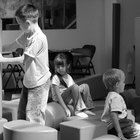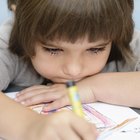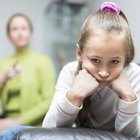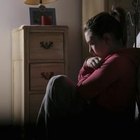
Emotionally abusive marriages can have long-lasting, negative effects on children. Children who grow up surrounding by arguing, name-calling and disrespect often develop anxiety and depression as well as struggle with behavioral and academic problems. While children of divorce may exhibit similar behaviors and symptoms, other children adjust to divorce over time, particularly if their parents are able to maintain an amicable relationship.
Dynamics of Emotional Abuse
Children exposed to emotional abuse such as name-calling, manipulation and threats often suffer from poor self-esteem, worry, separation anxiety, clinginess and fear of failure, explains the website of Community Overcoming Relationship Abuse, a safe haven for persons experiencing domestic violence. When children exposed to emotional abuse get older, they are at heightened risk of experiencing substance abuse problems. Likewise, teens who grow up in an emotionally abusive home may engage in delinquent behaviors or sexual promiscuity.
Effects of Divorce
Divorce can have significant negative effects on children, much like emotional abuse. Many of these negative effects stem from the basic change in the family structure, says psychologist Carl Pickhardt in “Psychology Today.” However, the Utah Divorce Commission reports that children who grow up with parents who have a “high conflict marriage” and stay together generally have poorer outcomes than children in similar families whose parents divorce. In other words, children fare better when they are not exposed to abusive, stressful dynamics, even if it means parental separation.
Parental Attitudes
Although both divorce and emotional abuse can lead to behavioral and emotional problems, parents’ attitudes and reactions to these situations can mitigate some of the traumatic effects of strained relationships. Parents who foster cooperative shared custodial arrangements after a divorce can minimize some of the anxiety and adjustment that comes with divorce, explains psychologist Lesley Foulkes-Jamison, a former therapist of Clinical Psychology Associates of North Central Florida who now works in private practice in South Carolina. Further, Foulkes-Jamison states that it is the quality of visits with non-custodial parents that matters, not necessary the quantity. In other words, when children are exposed to positive attitudes, they will experience better outcomes than children who see negative interactions between their parents. Even children exposed to emotional abuse can maintain relatively strong mental health if they do not feel threatened personally, reports Deborah Corbitt-Shindler of Southern Methodist University’s Department of Psychology.
Children and Resiliency
A child’s temperament and age can affect how they respond to both divorce and emotional abuse, says the Utah Divorce Commission. For example, young children who do not understand the dynamics of divorce may respond more negatively to parental separation than older children. Likewise, young children exposed to verbal abuse may feel more secure than older children who can understand better when parental aggression is not directed toward them. In either situation, having positive interactions with children, involving them in pro-social activities such as sports and giving the child a safe space to share her feelings can help minimize the negative effects of both divorce and parents who engage in emotionally abusive dynamics.
Related Articles

Traumatic Effects of a Bad Marriage on ...

How Children Are Affected When Living ...

The Effect of Divorced Parents on a ...

How Poor Relationships Affect the Family

Family Conflict Examples

Facts About Orphans

How Absent Fathers Affect Men

Problems With Teen Marriage

A Brother's Influence on a Younger ...

How to Reconnect With Estranged Children

Description of a Child Care Center

What Effects Can Stress Have on a ...

How Does an Overbearing Mother Affect a ...

Does Grandparents Moving Away Affect ...

Effects of Divorce on Children in ...

The Importance of Teenage Friendships

Symptoms of Adult Survivors of Child ...

What Are the Effects of High School ...

The Negative Effects of a Divorce

What Are the Benefits of Father Figures ...
References
Writer Bio
Anna Green has been published in the "Journal of Counselor Education and Supervision" and has been featured regularly in "Counseling News and Notes," Keys Weekly newspapers, "Travel Host Magazine" and "Travel South." After earning degrees in political science and English, she attended law school, then earned her master's of science in mental health counseling. She is the founder of a nonprofit mental health group and personal coaching service.
Photo Credits
David De Lossy/Photodisc/Getty Images